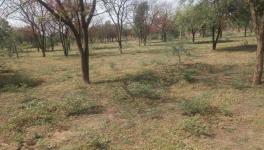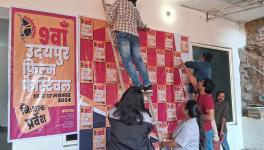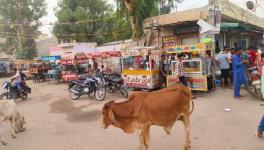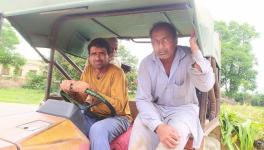Eyes on R-Day Tractor Parade, Women Take Charge of Protest at Rajasthan-Haryana Border
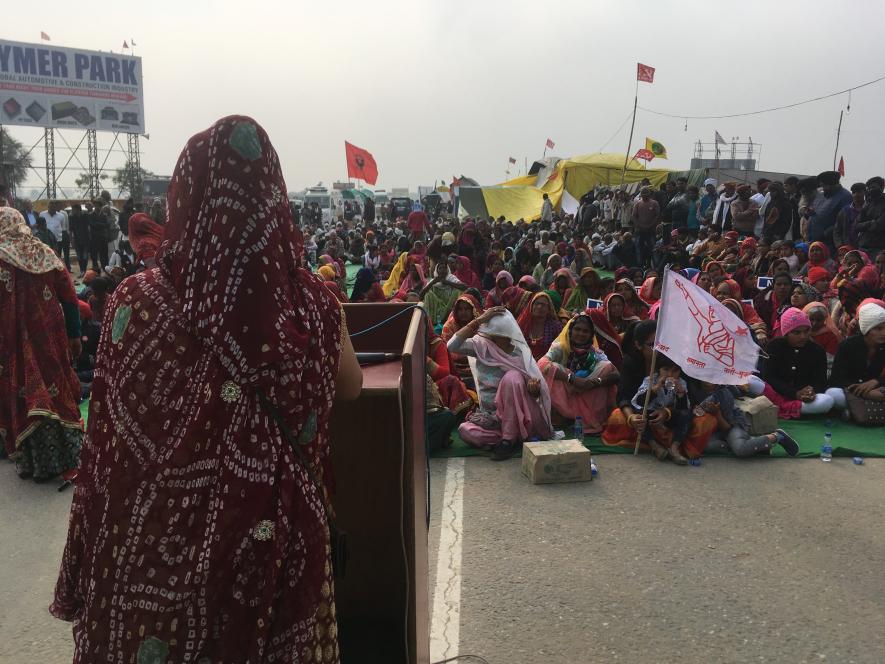
A woman managing the stage at Shahjahanpur border on Monday. Image clicked by Ronak Chhabra
Shahjahanpur/Alwar: Be it management of the stage, addressing the public, or even participate in hunger strike in support of the cause – all these activities at the protest site were managed by women farmers at the Shahjahanpur border on January 18, which was celebrated as Mahila Kisan Diwas by the protesting groups to commemorate the incomparable role of women farmers in agriculture.
With eyes set on tractor parade on Republic Day, women also drove tractors, in what they termed as a “trial run”, here at the Delhi-Jaipur highway that runs across the border protest point which connects Rajasthan and Haryana.
The Samyukt Kisan Morcha, the umbrella body that is spearheading the farmers' protests at the gates of Delhi, has called for the tractor march in the national capital on January 26.
The Mahila Kisan Diwas (Women Farmers Day) was celebrated at all the border points where farmers demanding repeal of the reform-oriented farm legislations are currently camping.
At the Shahjahanpur border, Chandra Kala Verma, state president of the All India Democratic Women Association (AIDWA) - Rajasthan said that the day saw women taking up the charge of the protests here. “Women managed the protest stage here today, from where only women protesters addressed the public today,” she said.
The women, while speaking, are largely sharing about their experiences back in their villages about their “active roles” in their farm fields, Verma added.
Also read: Women Aren’t Just Giving ‘Bhagidari ‘ but ‘Aguvaai ‘ to Farmers’ Struggle: Harinder Kaur Bindu
Listening to the speeches, women also occupied the initial rows in the audience. They hail from different states such as Rajasthan, Haryana, Maharashtra, Punjab, Kerala, Uttar Pradesh, Madhya Pradesh, among others.
“These women coming from their home states performed cultural programmes, along with singing and dancing together,” Dr. Seema Jain from Rajasthan’s Bikaner, who was handling the women speakers on Monday, told NewsClick.
The female cultivators also began a campaign on the occasion that was named, “Thaap Maaro Modi Ko (Hit back Modi)”. Women protesters also put their hand imprints on a long white coloured piece of cloth, which had “Kisan virodhi kaanon wapas lo (Take back anti-farmer laws)” written on it, in what Jain termed as a “solidarity” act.
Parminder Kaur, 47, from Punjab’s Ferozepur district said women are always the “first” to support the “fight to save their family.” “The new farm laws will affect our already dwindling family’s income… aise mein kaise ghar chalega aur kaise bacche paalenge (in that case, how will we run our household and feed our children),” she lamented.
Joined by some 15-odd other women of similar age group from her district, Kaur said that she has been camping here since “more than a month now.” “We won’t go back until our demands are accepted,” she said, her eyes lit with confidence.
Premlata, who is in her 30s, said, “Few days back we were asked to go back to our homes. It was because they know that if women continue to remain on the streets then the Modi government will be left with no other option but to back down.”
Hailing from Rajasthan’s Alwar, Premlata was referring to the remarks of Chief Justice of India S A Bobde, who while hearing petitions concerning the farmers’ protests in the Supreme Court, questioned why women and elders are “kept” in the protests and had urged that they both be requested to leave.
“The Supreme Court must know that women have always stood shoulder to shoulder with men. Come to our farms and see for yourself how much we are engaged in farming,” Premlata said, adding in anger, “Then why shouldn’t we protest?”
The need to exercise women’s agency, and above all respecting it, in protests and other spheres was likewise echoed by others as well.
Reena Yadav, 37, a teacher in Haryana’s Rewari said that the participation of women in such protests also bears effects in challenging the many stereotypes that still mar their life back in rural areas.
“In villages, a woman takes care of the field and her family, and is still not independent enough to take her own decisions,” Yadav said.
Also read: Thousands of Women Farmers in Telugu States Join Protests Marking Mahila Kisan Divas
She quipped, to illustrate the point, that she herself didn’t tell her husband on Monday before coming to the protests and joining her “comrades”. “Had I asked him, he would have said a straight no,” she added.
Since last month, for everyday at Shahjahanpur border, 11 individuals abstain from eating for a day to pay tribute to those who have lost their lives during the current farmers’ movement. On Monday, this relay hunger strike also saw full participation from women.
Ashwini Chauhan, 35, from Maharashtra’s Aurangabad, who was among those on hunger strike on Monday, hoped to raise their local demands, too, amid the demand for repeal of the laws.
“Our family tills a 5-acre land back where I come from, but the land is not registered under our name. A fear is always looming over us that someday we might be evicted. If only the land patta is provided to us… it has been a struggle now for many years.” Chauhan explained.
She argued that the new farm laws will only make things “worse” for her as she fears that the reforms will further drive down market prices for the crop produce.
On Monday, a group of 100-odd protesters from Kotputli’s Shuklawas village in Rajasthan also reached Shahjahanpur border on about 30 tractors, driven by women.
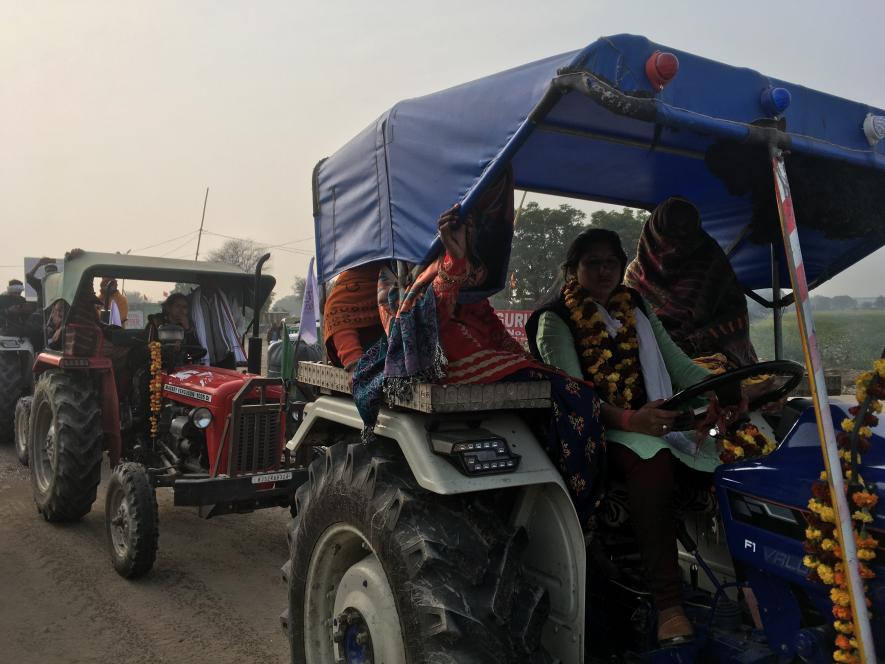
Women, driving tractors, reached Shahjahanpur border in the afternoon. Image clicked by Ronak Chhabra
Leading them was 24-year old Nisha Yadav, who claimed that the women will be there on the “forefront” in the parade on Republic Day. “Today’s rally was only a trial run… on January 26, the women on tractor will teach Modi a lesson,” she said.
Since last two-three days, numerous women have been practising how to ride a tractor daily here at Shahjahanpur border.
More than 300 districts saw women farmers assert their rights as farmers of the country, highlighting most of all that 75% of all agricultural work is done by women and the three Farm Acts will ruin their livelihood and survival most of all, the All India Kisan Sangharsh Coordination Committee (AIKSCC), one of the constituent of SKM, said in a press statement on Monday.
Get the latest reports & analysis with people's perspective on Protests, movements & deep analytical videos, discussions of the current affairs in your Telegram app. Subscribe to NewsClick's Telegram channel & get Real-Time updates on stories, as they get published on our website.









